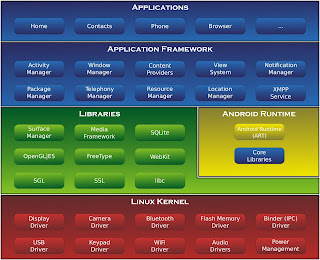· Android Architecture
Android Architecture
Android Application Architecture (Leyer wise describe) :-
Application framework. The application framework is most used by application developers. As a hardware developer you should
be aware of developer APIs as many map directly to the underlying Hardware
Abstraction Layer interfaces and can provide helpful information about
implementing drivers.
·
Binder IPC. The Binder Inter-Process Communication mechanism allows the
application framework to cross process boundaries and call into the Android
system services code. This enables high level framework APIs to interact with
Android system services. At the application framework level, this communication
is hidden from the developer and things appear to "just work".
·
System services. System services are modular,
focused components such as Window Manager, Search Service, or Notification
Manager. Functionality exposed by application framework APIs communicates with
system services to access the underlying hardware. Android includes two groups
of services: system and media.
·
Hardware abstraction layer (HAL). A HAL defines a
standard interface for hardware vendors to implement, which enables Android to
be agnostic about lower-level driver implementations. Using a HAL allows you to
implement functionality without affecting or modifying the higher level system.
HAL implementations are packaged into modules and loaded by the Android system
at the appropriate time. For details, see Hardware Abstraction Layer.
·
Linux kernel. Developing your device drivers is similar to developing a
typical Linux device driver. Android uses a version of the Linux kernel with a
few special additions such as Low Memory Killer, wake locks the Binder IPC
driver, and other features important for a mobile embedded platform. These
additions are primarily for system functionality and do not affect driver
development. You can use any version of the kernel as long as it supports the
required features. However, we recommend using the latest version of the Android
kernel. For details, see building Kernels.
Most Read:- Android Components







0 Comments
Hello Friends, Please comment and share and do not write spam messages